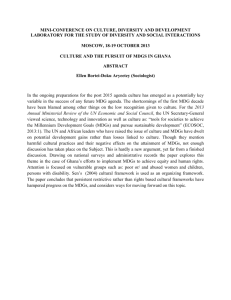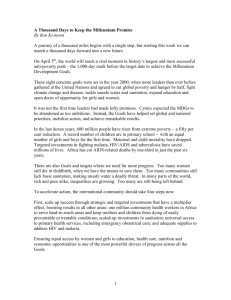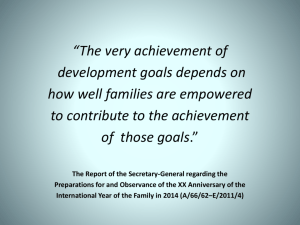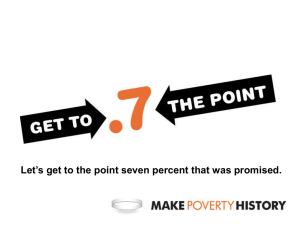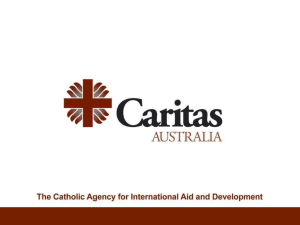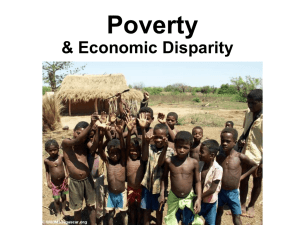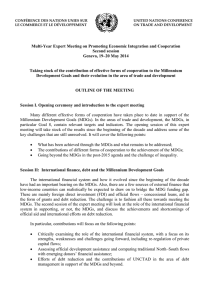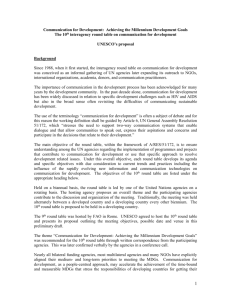Financing Development at the G8 Summit 2003
advertisement
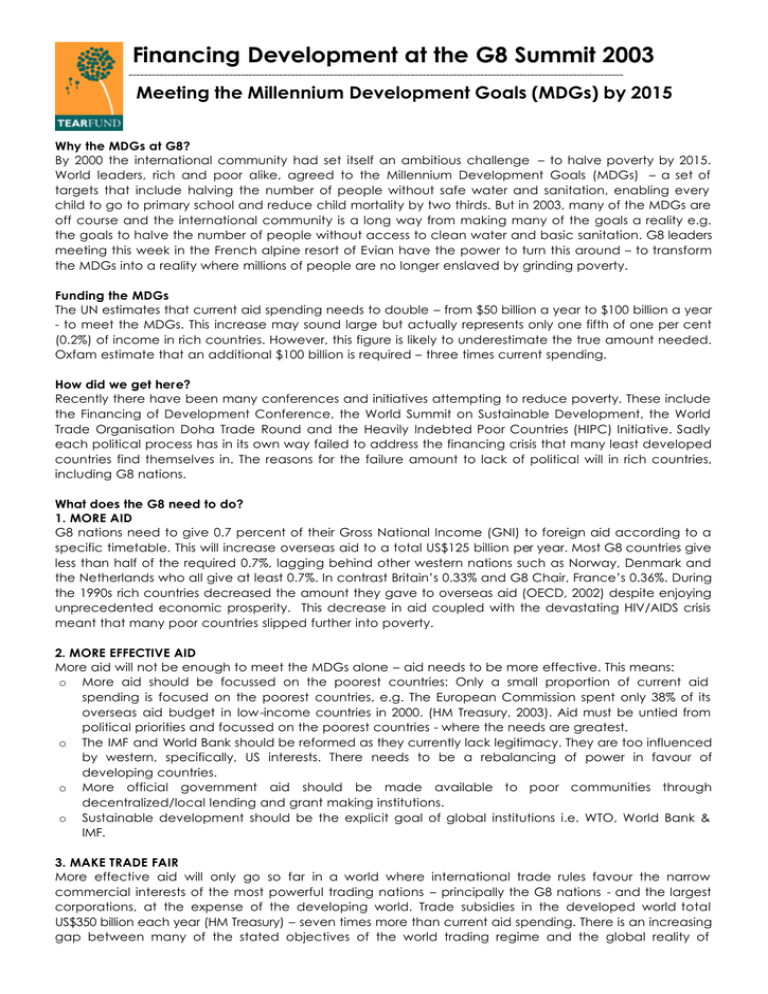
Financing Development at the G8 Summit 2003 -------------------------------------------------------------------------------------------------------------------------------- Meeting the Millennium Development Goals (MDGs) by 2015 Why the MDGs at G8? By 2000 the international community had set itself an ambitious challenge – to halve poverty by 2015. World leaders, rich and poor alike, agreed to the Millennium Development Goals (MDGs) – a set of targets that include halving the number of people without safe water and sanitation, enabling every child to go to primary school and reduce child mortality by two thirds. But in 2003, many of the MDGs are off course and the international community is a long way from making many of the goals a reality e.g. the goals to halve the number of people without access to clean water and basic sanitation. G8 leaders meeting this week in the French alpine resort of Evian have the power to turn this around – to transform the MDGs into a reality where millions of people are no longer enslaved by grinding poverty. Funding the MDGs The UN estimates that current aid spending needs to double – from $50 billion a year to $100 billion a year - to meet the MDGs. This increase may sound large but actually represents only one fifth of one per cent (0.2%) of income in rich countries. However, this figure is likely to underestimate the true amount needed. Oxfam estimate that an additional $100 billion is required – three times current spending. How did we get here? Recently there have been many conferences and initiatives attempting to reduce poverty. These include the Financing of Development Conference, the World Summit on Sustainable Development, the World Trade Organisation Doha Trade Round and the Heavily Indebted Poor Countries (HIPC) Initiative. Sadly each political process has in its own way failed to address the financing crisis that many least developed countries find themselves in. The reasons for the failure amount to lack of political will in rich countries, including G8 nations. What does the G8 need to do? 1. MORE AID G8 nations need to give 0.7 percent of their Gross National Income (GNI) to foreign aid according to a specific timetable. This will increase overseas aid to a total US$125 billion per year. Most G8 countries give less than half of the required 0.7%, lagging behind other western nations such as Norway, Denmark and the Netherlands who all give at least 0.7%. In contrast Britain’s 0.33% and G8 Chair, France’s 0.36%. During the 1990s rich countries decreased the amount they gave to overseas aid (OECD, 2002) despite enjoying unprecedented economic prosperity. This decrease in aid coupled with the devastating HIV/AIDS crisis meant that many poor countries slipped further into poverty. 2. MORE EFFECTIVE AID More aid will not be enough to meet the MDGs alone – aid needs to be more effective. This means: o More aid should be focussed on the poorest countries: Only a small proportion of current aid spending is focused on the poorest countries, e.g. The European Commission spent only 38% of its overseas aid budget in low-income countries in 2000. (HM Treasury, 2003). Aid must be untied from political priorities and focussed on the poorest countries - where the needs are greatest. o The IMF and World Bank should be reformed as they currently lack legitimacy. They are too influenced by western, specifically, US interests. There needs to be a rebalancing of power in favour of developing countries. o More official government aid should be made available to poor communities through decentralized/local lending and grant making institutions. o Sustainable development should be the explicit goal of global institutions i.e. WTO, World Bank & IMF. 3. MAKE TRADE FAIR More effective aid will only go so far in a world where international trade rules favour the narrow commercial interests of the most powerful trading nations – principally the G8 nations - and the largest corporations, at the expense of the developing world. Trade subsidies in the developed world total US$350 billion each year (HM Treasury) – seven times more than current aid spending. There is an increasing gap between many of the stated objectives of the world trading regime and the global reality of growing inequalities and environmental degradation. The benefits of the international trade system have gone to those who already have the most, while many of the poorest have failed to benefit fully and some have even been made poorer. The environment also suffers. Increasing consumption and transport related to more international trade, particularly in the industrialised world, have contributed to extra pressure on the world’s natural resources and habitats. The growing importance of trade and competitiveness to national economic decision-making has also had a ‘chilling’ effect on the development of environmental and social policy in some countries. As a member of the Trade Justice Movement Tearfund believes that G8 nations should prioritise poverty reduction at the next WTO trade round in Cancun, Mexico in September by ensuring that: o Poor countries are not forced to open their markets and are able to manage their economies according to their own economic interests o Big business is regulated to ensure people and the environment come before profits o Rich countries are not allowed to promote the interests of big business through trade interventions that harm the poor and the environment. o The WTO remit is not expanded to include new issues such as investment o In order to rebalance the global trading system, international trade rules and institutions must take their place within the broad system of international agreements aimed at sustainable development, poverty eradication and the promotion of human rights, and recognise the importance of local and regional trade as an engine for sustainable development and poverty eradication. 4. CANCEL THE DEBT Full debt cancellation is essential for meeting the MDGs. Without it a large slice of any increase in aid will simply be forced to go into debt repayments rather than investing in health and education. Fifty-two of the world’s poorest countries owe an unpayable historical debt to the rich world of over US$300 billion. At the 1999 G8 Summit in Cologne leaders promised to write off more than $100 billion of debt for 42 poor countries via the HIPC Initiative. At only one third of the total $300 billion of unpayable debt it fell short of the mark, but was a crucial first step. However, progress has been slow. Jubilee Debt Campaign, of which Tearfund is a member, estimate that only $36.5 billion of debt has been written off to date. The HIPC process needs to be overhauled and virtually all sub-Saharan African countries within HIPC need immediate 100 per cent debt cancellation if they are to meet the MDGs. What about the International Finance Facility (IFF)? The British led initiative, the International Finance Facility, aims to double current aid spending from $50 billion to $100 billion a year until 2015 in order to finance the MDGs. Tearfund welcomes the Government’s commitment to securing more money to meet the MDGs and believes that at this time the IFF is the most likely means of securing this extra money needed to meet the MDGs. In addition, the IFF’s commitment to focus on the poorest countries and to secure predictable aid flows is welcome news. However, Tearfund is concerned that the IFF underestimates the amount of additional aid required to do the job. Oxfam estimates that current aid spending needs to treble rather than double in order to meet the MDGs. Indeed, the Global Water Partnership calculates that to meet the targets on water and sanitation alone, the international community must find an extra US$30 billion a year. But it’s not just a question of more money. Tearfund believes that any additional aid raised through the IFF must be effective and therefore go hand in hand with reform of how aid is spent, reform of IMF/World Bank and better targeting of aid. In addition, while the IFF recognises that further debt relief is needed, Tearfund is concerned that the IFF will not go far enough. Recent research demonstrates that 100% debt cancellation is required in order to meet the MDGs. Further, Tearfund is also concerned about the harmful conditions on all aid, including potential IFF money, such as prising open poor country economies in order to benefit big business. TEARFUND’S G8 RECOMMENDATIONS FOR MEETING THE MDGs 1) INCREASE AID: G8 nations should commit to increase overseas aid to 0.7% of national income with a coherent and time-bound plan for doing so. 2) INCREASE AID EFFECTIVENESS: G8 nations should untie aid, focus aid on the world’s poorest countries and prioritise poverty reduction 3) TRADE: G8 leaders should take the lead at September’s WTO meeting by prioritising poverty reduction over free trade 4) CANCEL DEBT: G8 leaders should commit to full debt cancellation
